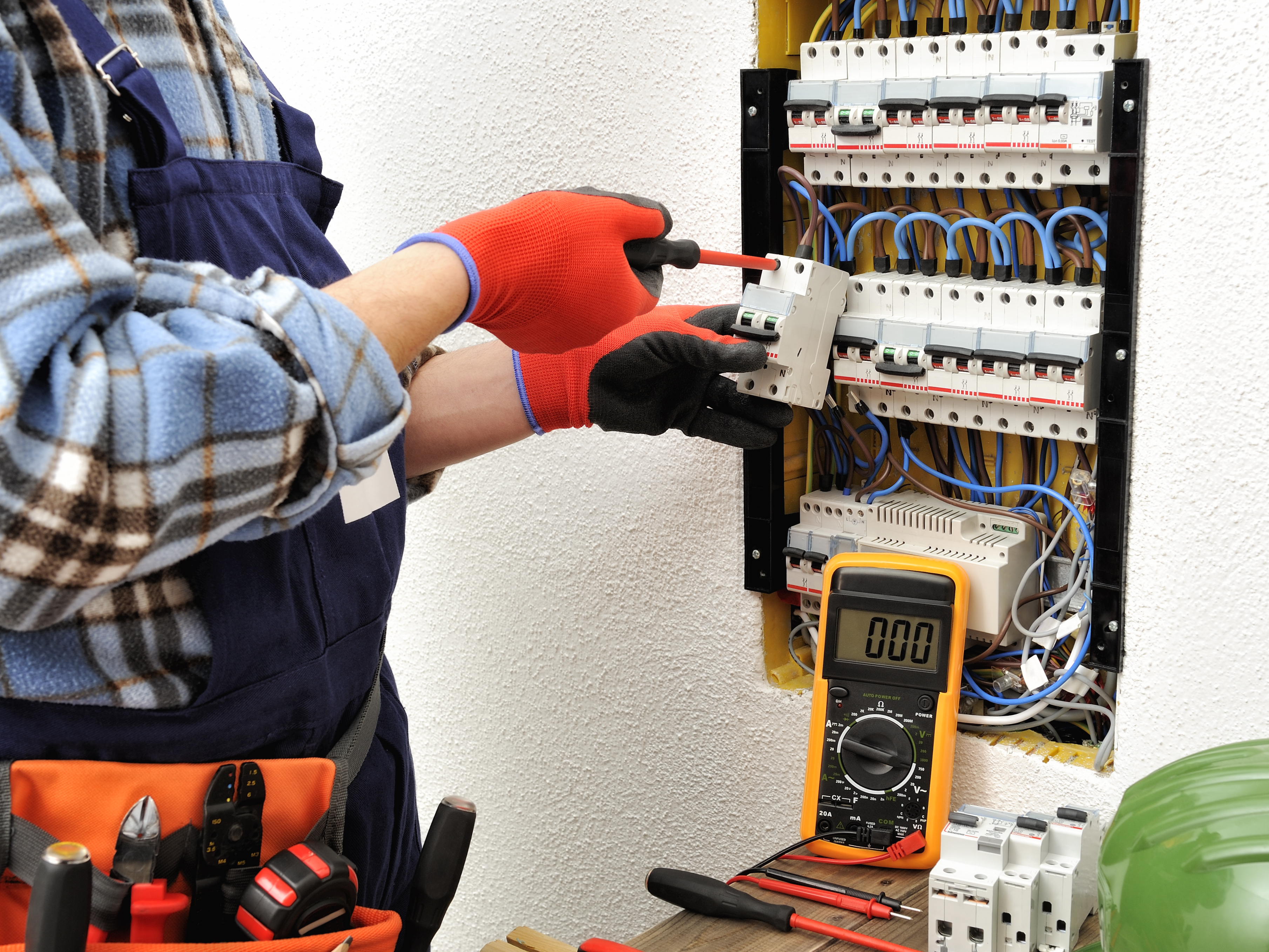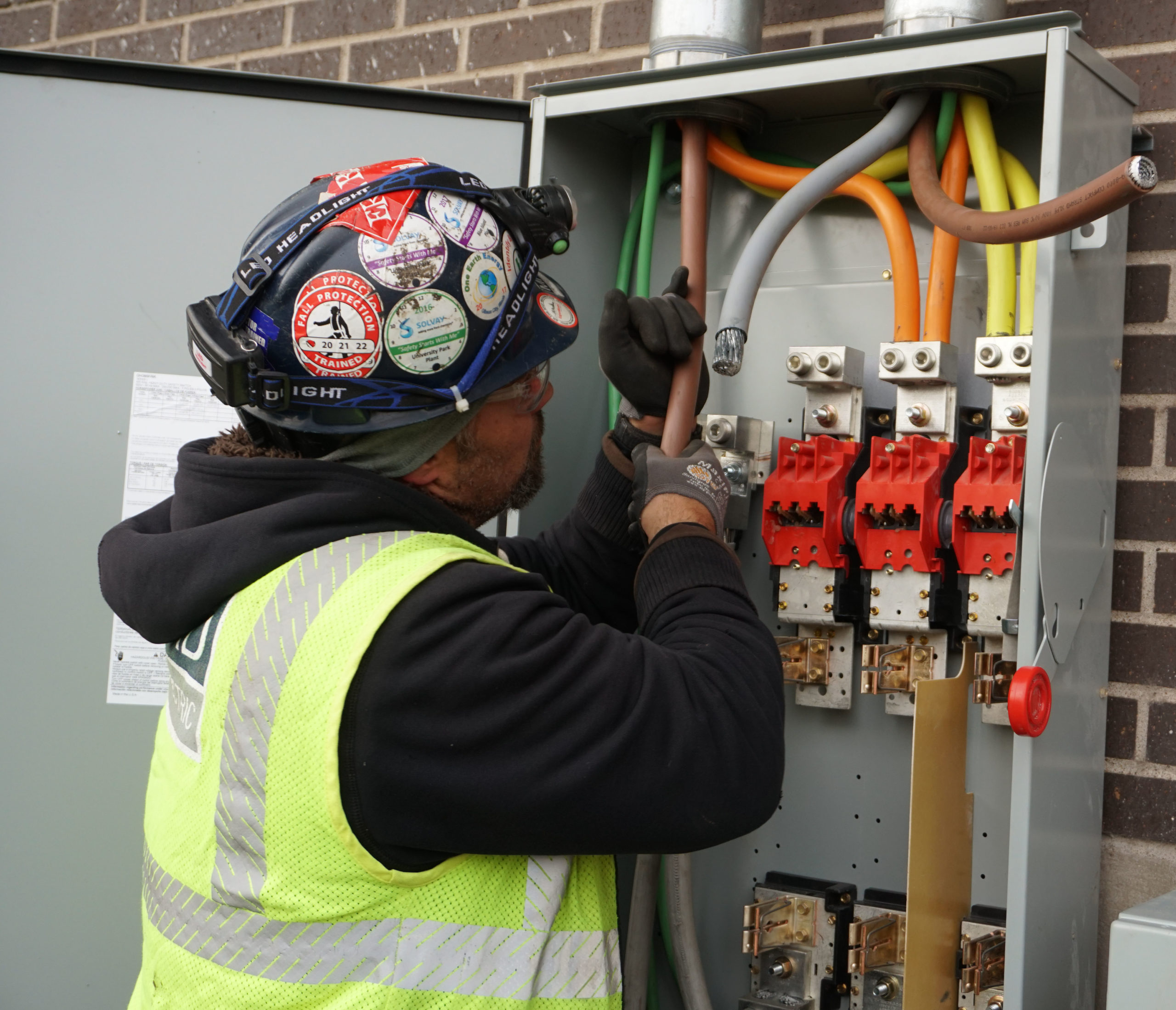Why Hiring Experienced Industrial Electrical Contractors is Vital for Your Facility's Success
Why Hiring Experienced Industrial Electrical Contractors is Vital for Your Facility's Success
Blog Article
The Comprehensive Function of Industrial Electricians in Ensuring Reliable Power Distribution and Electric Maintenance in Industrial Setup
The function of industrial electrical experts prolongs far beyond basic electric jobs; they are indispensable to the stability and performance of industrial operations. Recognizing exactly how their expertise not only safeguards operational connection however also contributes to sustainability initiatives elevates essential concerns regarding the future landscape of electric maintenance in commercial setups.
Relevance of Industrial Electricians
In lots of commercial settings, the role of electrical contractors can not be overstated. These professionals are indispensable to the procedure and maintenance of electrical systems, making sure that power circulation is efficient and trusted. Their knowledge not just supports the everyday performance of making procedures but also plays a vital function in boosting total office safety. Industrial electrical experts have specialized understanding of complex electrical systems, consisting of high-voltage equipment and automated equipment, which are vital for contemporary industrial procedures.
Additionally, the need for knowledgeable electricians remains to expand, driven by improvements in technology and enhanced reliance on automated systems. As sectors evolve, the need for electricians who can mount, troubleshoot, and maintain innovative electric infrastructure comes to be extremely important. Their contributions extend past plain installation; they are principals in making certain compliance with safety laws and sector requirements, thus decreasing risks related to electric failings.
Trick Obligations and Responsibilities
Industrial electrical contractors regularly engage in a range of key duties that are vital to the smooth procedure of power distribution systems. One of their main responsibilities consists of setting up, maintaining, and repairing electrical circuitry and equipment in industrial setups. This includes making certain that electrical systems follow safety and security laws and industry requirements to stop threats such as electrical fires or devices failing.
Along with installment tasks, industrial electrical contractors are in charge of troubleshooting and diagnosing electrical issues. They make use of specialized methods and devices to recognize mistakes in equipment and power distribution networks, making certain that any type of malfunctions are without delay resolved to decrease downtime. licensed electrical contractor. Routine upkeep is another crucial element of their role, where they perform routine evaluations and safety nets to keep systems working efficiently

Qualifications and abilities Required
Efficiency in electrical systems is essential for industrial electrical contractors, as it enables them to properly navigate the intricacies of power distribution (industrial electrical contractors). A solid foundation in electric theory, consisting of expertise of circuits, voltage, existing, and resistance, is critical. Industrial electrical experts must have a comprehensive understanding of electrical codes and guidelines to make sure compliance with industry criteria
Along with technological expertise, functional abilities are paramount. Effectiveness in troubleshooting and analytic permits electricians to diagnose and resolve issues successfully, reducing downtime in industrial procedures. Knowledge with numerous devices and equipment, such as multimeters, oscilloscopes, and power analyzers, is likewise essential for effective maintenance and repair service.
Additionally, industrial electricians are typically needed to have official education, normally culminating in an associate level or conclusion of an apprenticeship program. These programs offer hands-on training and academic understanding, outfitting electrical experts with the abilities needed for the field.
Accreditations, such as those from the National Institute for Accreditation in Design Technologies (NICET), can even more boost an electrical expert's qualifications, demonstrating experience and commitment to the career. Generally, a mix of education, useful experience, and technological skills is essential for success in this requiring function.
Safety And Security Requirements and Conformity
Conformity with safety and security standards is an essential facet of the commercial electrical contractor's duty in power distribution. Industrial electricians are tasked with sticking to a wide range of regulations and guidelines developed by organizations such as the National Electrical Code (NEC) and Occupational Safety And Security and Wellness Administration (OSHA) These requirements make sure not just the secure procedure of electric systems however also the security of workers and devices.
To achieve compliance, electrical contractors need to conduct regular inspections and upkeep of electric systems, recognizing prospective threats and implementing corrective steps. This consists of proper grounding, circuit defense, and the use of proper personal safety devices (PPE) By keeping a thorough understanding of both national and regional codes, electrical contractors can successfully alleviate threats connected with electric job.
Furthermore, industrial electricians play a vital role in training employees on safety practices and emergency treatments. This education and learning fosters a society of safety within the work environment, lowering the likelihood of mishaps and making see post certain that all staff members are conscious of their obligations relating to electrical safety.

Future Fads in Electric Maintenance
As modern technology remains to develop, the future of electrical maintenance in power distribution is significantly characterized by the integration of anticipating analytics and smart systems. These innovations allow industrial electrical experts to relocate beyond standard reactive upkeep techniques, promoting an aggressive strategy that enhances system dependability and efficiency.
One considerable trend is the adoption of Internet of Things (IoT) gadgets, which help with real-time surveillance of electric systems. This modern technology permits the collection of large amounts of information, offering understandings into devices performance and potential failure factors. By leveraging predictive analytics, electricians can prepare for issues prior to they rise, minimizing downtime and maintenance costs.
Additionally, the implementation of innovative automation innovations is transforming electrical upkeep. Automated diagnostic tools can swiftly identify mistakes and suggest corrective activities, streamlining the fixing procedure. This not only enhances feedback times however also minimizes human mistake.
Additionally, the expanding focus on sustainability is driving the advancement of energy-efficient services and renewable power integration. As industrial markets progressively take on greener techniques, electricians will play an essential duty in keeping these systems, ensuring that power circulation aligns with environmental criteria. Generally, the future of electrical maintenance promises boosted integrity, effectiveness, and sustainability.
Conclusion
In final thought, commercial electrical experts are crucial to the capability and safety and security of industrial settings. The function of industrial electricians will certainly proceed to broaden in significance.
The function of industrial electricians prolongs much past fundamental electric tasks; they are indispensable to the security and efficiency of industrial procedures (licensed electrical contractor). Industrial electrical contractors have specialized understanding of intricate electric systems, including high-voltage devices see post and automated equipment, which are important for modern industrial operations
Moreover, commercial electricians team up with designers and other that site professionals to develop and execute reliable electric systems tailored to details industrial demands.Proficiency in electrical systems is vital for industrial electricians, as it allows them to efficiently navigate the intricacies of power circulation.In final thought, commercial electrical experts are essential to the performance and security of commercial environments.
Report this page